The first the Maria Lenk aquatic centre knew of Tom Daley and Daniel Goodfellow’s bronze medal in the 10 metre platform dive was a screeching cry from the Team GB coach Jane Figuero a microsecond before the arena itself erupted.
For Daley and Goodfellow, the pursuit of the leaders had come down to the very last knockings, the final dive of 36 in a gruellingly high-end competition. Picked out for a moment against the grey fuzz of the evening sky, they paused, charged and hurled themselves into a final back 3.5 somersault pike, producing under extreme pressure a genuinely beautiful moment of plunging synchronicity.
As they surfaced, Daley hugged Goodfellow, eyes fixed now on the scoreboard at the far end. Then came the scream, the cheers, the row of 9s and 8.5s, and a lovely spontaneous arm-in-arm plunge into the shallows.
For Daley, this was a second Olympic bronze, and an unarguable sporting vindication for a British athlete whose extreme achievements can be obscured for some by his glitz, his televisual burnish, his celebrity six-pack. The fact remains, though, that in an era of Chinese dominance, Britain has a self-made bona fide diving heavyweight, a lively, likeable pop-kid of the high board who has now won exactly 50% of Britain’s Olympic diving medals since the 1920s.
It is a success all the more remarkable for the fact that Daley’s entire career, from dinky fresh-faced teenager to dinky fresh-faced adult, has been played out in that superstar diving-boy glare. In the buildup here, even his trunks have been a topic of fascination, with reports of Daley seeking an audience with Stella McCartney during design process to reconfigure the precise flow and stretch of his pouch. His attention will now refocus ahead of the individual competition starting a week on Friday. Don’t expect Daley to blink.
It was a late-breaking success built from a steady start. As the divers marched out on the poolside in their tracksuits, there were cheers and whistles around a half-full arena. The Maria Lenk is an intimate little water park on the far edge of Rio’s Olympic Park with the hills of suburbs poking in above the lip of the stand. Open to the air, built on top of an old military complex, it is a slightly eerie corner of the park with a Ballardian murkiness to its endless corridors and gantries and grey-beige interiors.

Daley and Goodfellow were down to dive last through the six rounds of escalating difficulty, the ultimate test of a routine honed over months of training, during which Goodfellow has moved to London to live with Daley, the two men forming an unusually tight bond both on and away from the board.
As the divers strode mournfully forward to complete their plunge, oddly stark up there on the highest board, it was striking what a strange activity diving is in isolation. Most sports involve the need to run or fight or leap. In diving it is only contortions during a descent governed by non-negotiable gravity. These are the human race’s masters of falling.
The Russians went first, Victor Minibaev and Nikita Shleikher performing a pared back backwards somersault that seemed to hang as they plunged down out of the grey, past the pyramid of blue-blazered judges. Later a mediocre set of scores for the Ukrainians was whistled and booed, as was the row of eights for the Brazilian pair. The rhythm was gripping: a blast of disco music, a fluster of applause, whistles at the appearance of the two small, bronzed figures at the mouth of the top board, then the hush, the craned necks, the thud of entry.
Finally Daley and Goodfellow emerged for their opener, kicking off with an inward 1.5 somersault pike. As they paused and stretched, a flock of seabirds flew by cawing at the end of the stadium, a reminder of the background fog of complaints and gripes around these Olympic Games that has become a mini-industry in itself, fed with blaring accounts of each malfunctioning vending machine.
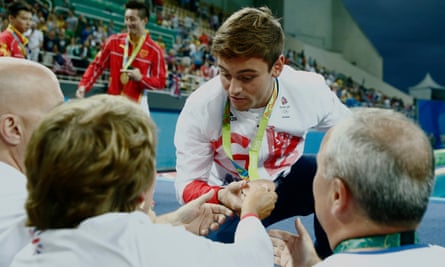
The Maria Lenk arena has had its problems too, mainly focused on mosquito issues, driven by the fertile breeding ground of a nearby stagnant lagoon. There have been misgivings among the divers about competing outdoors, with all its variables of sunlight and wind. Here it was a muggy, slightly unsettling day, with a low fuzz of bruised cloud clinging over the hills behind the board. Undisturbed by the birds, Daley and Goodfellow produced a solid effort that took them to third place.
And so it went on, the Chinese pair Aisen Chen and Yue Lin pulling away steadily on the board, ahead of the agreeably expressive Mexicans, who went through a kind of psyching-up routine before some of their dives, unusual in this most mannered and stately of water sports.
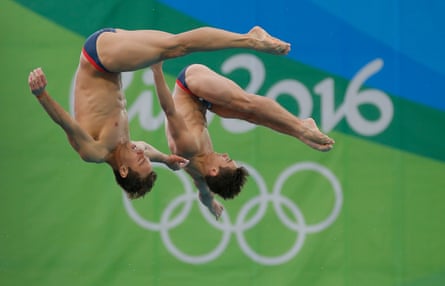
Daley and Goodfellow were a little looser with their reverse 1.5 somersault twist, a telling distance opening up mid-fall between those whirling torsos. The Chinese, immaculate in gleaming red trunks, swatted aside their first really difficult dive as the stakes rose. The British pair dropped to fifth as Mexico and Germany surged. Daley and Goodfellow shook their heads, retreating pensively to the poolside hot tub.
The key moment arrived with China’s fifth dive of six, the round during which the stakes are upped, and difficulties go through the roof. Chen and Yue took the judges for 9.5s and 10s, emerging from the water punching the air and whooping after four previous dives during which the favourites had remained sombre and reserved. Gold looked a certainty, the challenge for Daley and Goodfellow was to follow their vapour trail.
So to the final round. The Americans, David Boudia and the brilliantly named Steele Johnson, claimed silver with another immaculate dive, hugging with real feeling as they left the water. At which point, enter Daley and Goodfellow and a leap at the last into British Olympic history.
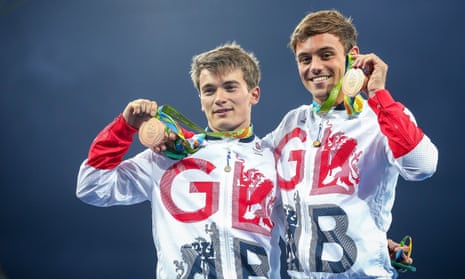
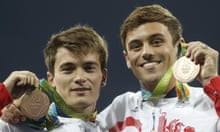
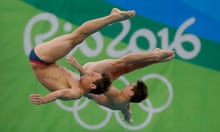

Comments (…)
Sign in or create your Guardian account to join the discussion